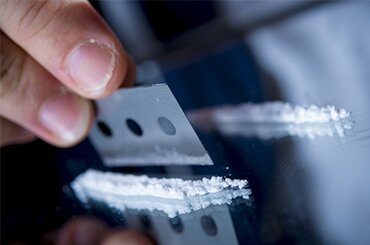- Effects and Side-Effects of Bath Salts
- Summary of Media Reports on Bath Salts and Violence
- Research on Bath Salts and Violence?
- Excited Delirium Syndrome
- Conclusion
- Sources
What are Bath Salts?
'Bath salts' are the common term used in reference to new-generation designer drugs such as 3,4-methylenedioxypyrovalerone (MDPV) and mephedrone.
In molecular form, bath salts are derived from the naturally occurring cathinone 'khat' plant.
Effects and Side-Effects of Bath Salts
Bath salts are suitable for intake by any conventional route, i.e. inhalation by smoking, intravenous injection or by insufflation, or 'snorting'. The following effects of bath salts may explain tendencies towards aggressive behavior or violence:
-
 Dopamine is associated with the control of motivation, impulses and some dimensions of emotional perception.
Dopamine is associated with the control of motivation, impulses and some dimensions of emotional perception.
- Bath salts alter dopamine concentrations; these alterations can lead to an increased tendency towards enthusiasm and hyperactivity, as well as bizarre or aberrant behaviors.
-
 Dopamine alterations can also cause agitation and reduced impulse control, which may enhance aggressive tendencies.
Dopamine alterations can also cause agitation and reduced impulse control, which may enhance aggressive tendencies.
- Norepinephrine has chemical similarities to dopamine. It has been linked to the control of defensive behaviors--which may range from avoidance to violence.
MDPV increases the concentrations of the neurotransmitters dopamine and norepinephrine in the brain. Dopamine dysregulation is an effect shared by another popular stimulant, cocaine; however, MDPV is much more potent than cocaine.
Therefore, it is reasonable to assume that bath salts abuse may increase the risk of aggressive and violent behaviors, particularly in people who suffer from psychiatric issues that can exacerbate the manifestation of these symptoms. If you or someone you love needs help,
please call
1-888-993-3112Who Answers? to speak to one of our treatment support providers today.
A number of alarming news reports that implicate the role of bath salts in violence have been reported in the media. Most notably:
Therapists are Standing By to Treat Your Depression, Anxiety or Other Mental Health Needs
Explore Your Options Today
Ad
Research on Bath Salts and Violence?
Research in the area is not conclusive.
 Regardless of violence, continuous use of bath salts can damage your brain and body.
Regardless of violence, continuous use of bath salts can damage your brain and body.
- On one hand, neurological data indicate that the use of 'bath salts' does not necessarily cause brain damage and that negative behavioral tendencies are associated with acute (or profound but short-term) effects on the neurotransmitter mechanisms mentioned above.
- On the other hand, some data have shown that mephedrone may enhance the damage done to neural tissues in areas of the brain associated with the conscious control of movement and motivational processing.
The alteration of these key areas may be implicated in impulsive and aberrant behaviors.
Observational case reports may not definitively give us an answer but are useful in examining the incidence of violence associated with bath salts use. A number of these reports have described patients who presented with psychotic symptoms in conjunction with bath salt use.
- One documents a new-onset disorder in a 40-year-old man with no history of psychiatric problems.
- Another describes a case in which a male emergency department patient, who admitted to taking bath salts, presented with delusional symptoms.
- He became agitated and developed heart-rate anomalies prior to his death.
- Another described the case of a 23-year-old male patient who presented with bizarre behavior, threats of suicide and self-reported hallucinations.
- High levels of MDPV and mephedrone (another cathinone derivative) were found in his blood, and he admitted to snorting these drugs.
- In this case, the psychotic symptoms associated with these drugs were resolved through treatment with sedatives.
Excited Delirium Syndrome
Excited delirium is a state induced by neurological alterations; it is commonly associated with the use of cocaine. However, these symptoms may also be associated with the use of bath salts, and may be due to the action of MPDV.
- Prolonged use of bath salts leads to abnormally high and consistent levels of dopamine in the brain, increasing the risk of violent, delusional, aberrant and agitated behavior.
- Excited delirium causes acute distress and can lead to death in extreme cases.
Conclusion
There is no definitive answer, but it is clear that persistent use of bath salts can result in aberrant behavior, which may or may not lead to violence towards the self or others. It can be reasonably assumed that violence is one outcome in the spectrum of possibility.
Summary:
The abnormally
high concentrations of dopamine and norepinephrine may result in the development of behavioral anomalies, aberrations, and violent tendencies.
The acts of violence, based on some reports, may be directed at people around an individual under the influence of bath salts, or at the individuals themselves.
Some case reports have also
documented the onset of psychosis, associated with the intake of 'bath salts,'in patients without a history of any other psychiatric anomalies.
These data lend additional weight to the theory that 'bath salts' can induce psychotic symptoms even in the absence of hereditary predispositions.
Sources
- Karch SB. Cathinone Neurotoxicity ("The "3Ms"). Current Neuropharmacology. 2015;13(1):21-25.
- John ME, Thomas-Rozea C, Hahn D. Bath Salts Abuse leading to New Onset Psychosis and Potential for Violence. Clinical schizophrenia & related psychoses. 2014:1-14.
- Kesha K, Boggs CL, Ripple MG, et al. Methylenedioxypyrovalerone ("bath salts"), related death: case report and review of the literature. Journal of forensic sciences. 2013;58(6):1654-1659.
- Thornton SL, Gerona RR, Tomaszewski CA. Psychosis from a bath salt product containing flephedrone and MDPV with serum, urine, and product quantification. Journal of medical toxicology : official journal of the American College of Medical Toxicology. 2012;8(3):310-313.
As advocates of mental health and wellness, we take great pride in educating our readers on the various online therapy providers available. MentalHelp has partnered with several thought leaders in the mental health and wellness space, so we can help you make informed decisions on your wellness journey. MentalHelp may receive marketing compensation from these companies should you choose to use their services.
MentalHelp may receive marketing compensation from the above-listed companies should you choose to use their services.
Ad

 Dopamine is associated with the control of motivation, impulses and some dimensions of emotional perception.
Dopamine is associated with the control of motivation, impulses and some dimensions of emotional perception. Dopamine alterations can also cause agitation and reduced impulse control, which may enhance aggressive tendencies.
Dopamine alterations can also cause agitation and reduced impulse control, which may enhance aggressive tendencies.